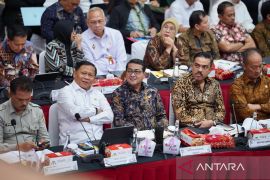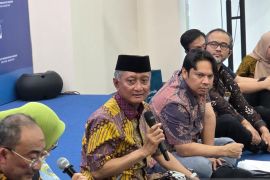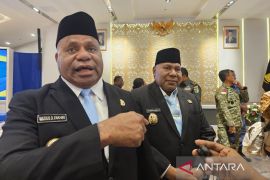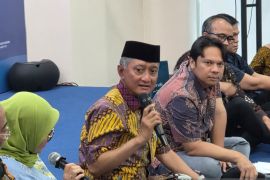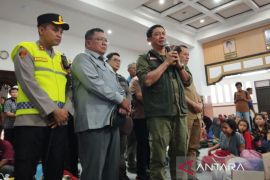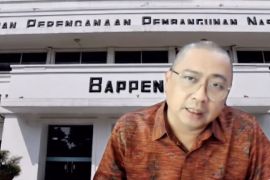Religious Affairs Minister Lukman Hakim Saifuddin stated that certification is necessary to maintain unity among Muslims and to foster plurality among Indonesians. However, the minister claimed that the discourse on the certification of religious preachers did not come from him but from the people.
"The government, through the Ministry of Religious Affairs, will only facilitate the peoples aspirations. The idea to certify religious clerics and preachers of Friday prayers came from Islamic organizations," Minister Saifuddin noted in Jakarta on Jan 30.
The government, as the facilitator, will give authority to Ulmas (Islamic scholars) or Islamic organizations to decide the standardization guidelines. The government will not act alone in deciding the certification of preachers, as the request came from the people who are represented by the Islamic organizations.
"Who is going to issue the standardization guidelines is a matter that does not fall in the governments domain. The certification is not my idea. They have urged the government for guidance in this matter," Minister Saifuddin pointed out.
The Ministry of Religious Affairs has taken note of the inputs and aspirations of Islamic mass organizations regarding the certification of preachers in line with the ministers intention to put in place standardization.
The Religious Affairs Ministry, in a written statement in Jakarta on Friday (Jan 24), had invited the Indonesian Ulema Council (MUI), the countrys largest Muslim organization Nahdlatul Ulama, Indonesias second-largest Muslim organization Muhammadiyah, dean of the Propagation Faculty of the Al-Washliah Islamic Institute, Communications Staff of the religious affairs minister, and Indonesian Preachers Association (IKADI), among others.
Director of Islamic Information of the Directorate General of Islamic Guidance Muchtar Ali stated that the meeting of the religious leaders was held to gauge the aspirations and to gather inputs from various sides on the development of Islamic propagation in Indonesia, notably with regard to the competence and standardization guidelines for clerics and preachers.
Propagation Commission Chairman of MUI Cholil Nafis stated that the council is interested in the plan to certify preachers. MUI is conducting a study on the standardization of clerics who are active in the media. The MUI has cooperated with the Indonesia Broadcast Commission to select clerics who appear in television programs.
Nafis remarked that MUI had conducted training on standardization guidelines for preachers, with materials containing ethics, propagation methods, and substance of sermons. Clerics who have appeared in television programs should be given attention, as they are related to several sides.
Hence, it is important for preachers to adhere to standardization guidelines while delivering proselytizing messages to the public.
The government has no intention to ban people from performing religious rituals, including whether a preacher can deliver a sermon.
"The government will not disallow uncertified preachers from delivering a sermon. It has no domain in banning it, as it is the peoples right to offer prayers at mosques," Minister Saifuddin noted.
However, Saifuddin pointed out that there are several mosques whose preachers sermons could trigger conflicts among Muslims, as the content of their sermons ran counter to Islamic values.
The content of Friday prayers sermons contains good advice, such as ways to strengthen faith and calls on Muslims to do good deeds. However, sometimes, there are preachers who give derogatory statements about others or make comparisons on others views, or whose sermons contradict the efforts to call for good deeds.
According to the minister, sermons during Friday prayers should be delivered in a promotional manner and not in a confrontational one. This is in line with Indonesias principles of plurality and unity.
"The Ministry of Religious Affairs and government have reminded that preachers should not deliver sermons that can trigger confrontations," he added.
In the meantime, IKADI Chairman M. Satori Ismail believed that if the certification process is implemented on a large scale, it would create problems or face rejection.
"I think this program will be effective if its implementation is started from mosques at government institutions. Hence, we should start it gradually, so that it would not create problems in the field," Ismail noted.
Legislator Desy Ratnasari of Commission VIII on Religious Affairs of the House of Representatives believes that the certification of religious preachers is an exaggeration.
"(If it is) implemented, it should be imposed on clerics of all religions as well," Ratnasari noted.
The current plan to impose certification will be viewed as being a biased one, as it only targets Islamic propagators.
Commission VIII Chairman Ali Taher stated that the ministers plan to impose certification on clerics and preachers of Friday prayers is untimely.
"I think it is good to increase competence and quality (through the certification plan), but it is not the right time to implement it," Taher remarked.
Meanwhile, Vice President Jusuf Kalla stated that it was not easy for the government to certify preachers who perform Friday prayers since mosques in Indonesia were built by the public and not by the state.
"Mosques in Indonesia were built and are being managed by the public. Propagation of Islam is something that falls in the domain of the community, so it is not easy to regulate these," he noted here on Friday (Feb 3).
Kalla, who is also chief of the Indonesian Mosque Council (DMI), stated that only mosques in three countries in the world -- Indonesia, India and Pakistan -- were built by the public.
Mosques in other countries, such as Malaysia, Turkey, and Middle Eastern nations, were built by their governments, he added.
Indonesia currently has about one million mosques, with the number of imams and preachers reaching an estimated five million.
"Admittedly, it is not easy. However, the important aspect is that we must see the depth of their knowledge," he pointed out.
One of DMIs programs is to come up with a Masjidku (My Mosques) application to categorize preachers of Friday prayers on the basis of their knowledge and understanding, so that the public can select them on that basis, he noted.(*)
Reporter: Andi Abdussalam
Editor: Heru Purwanto
Copyright © ANTARA 2017



